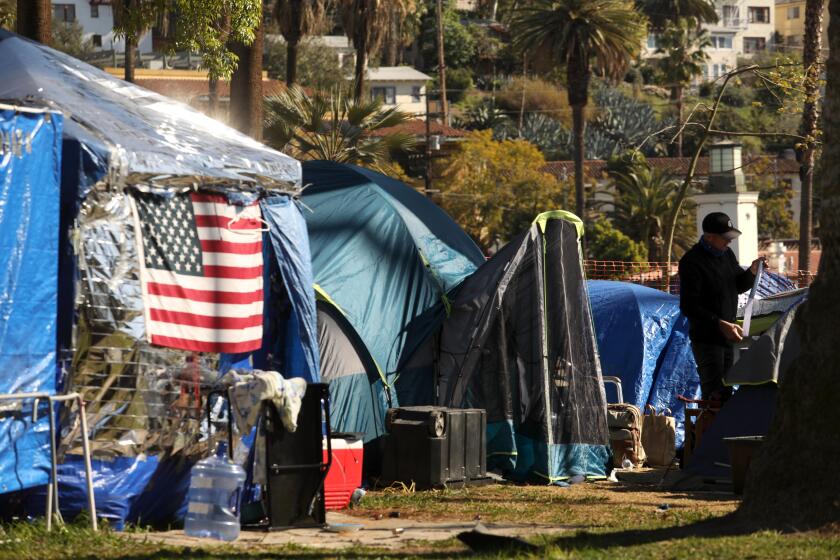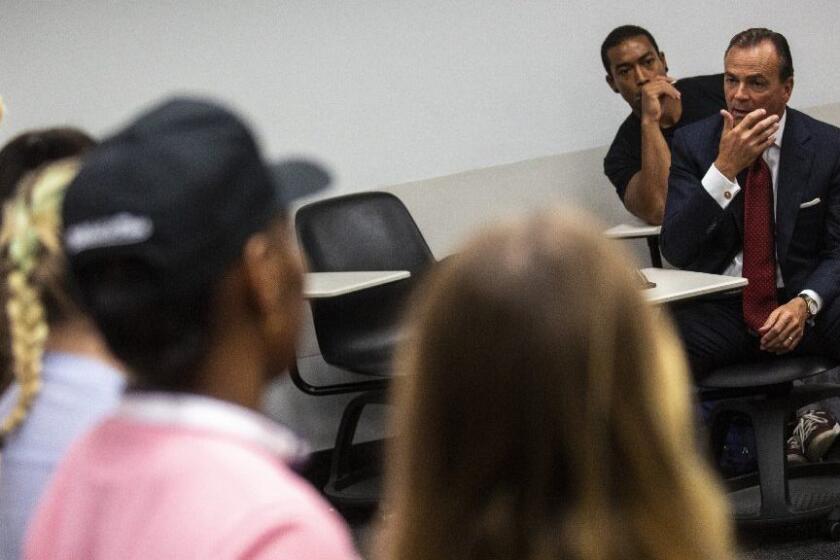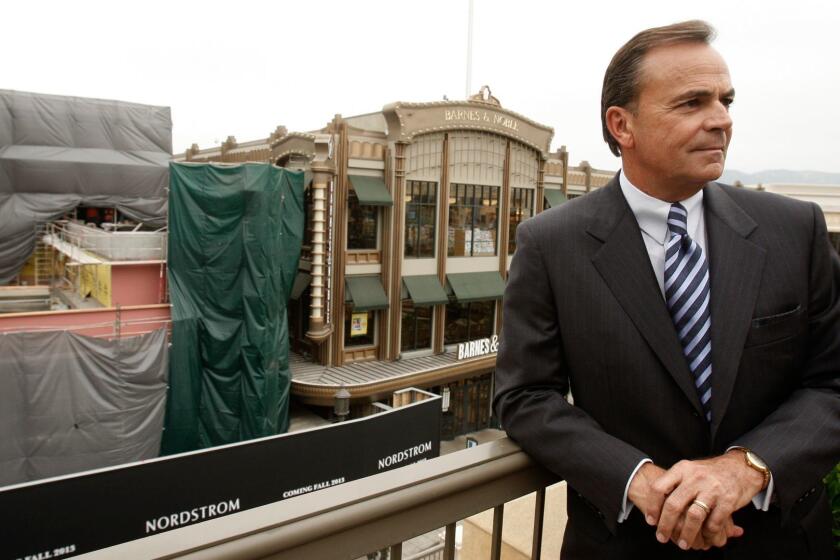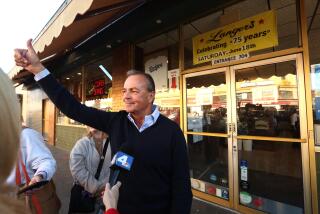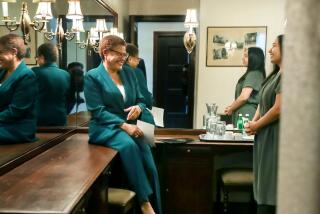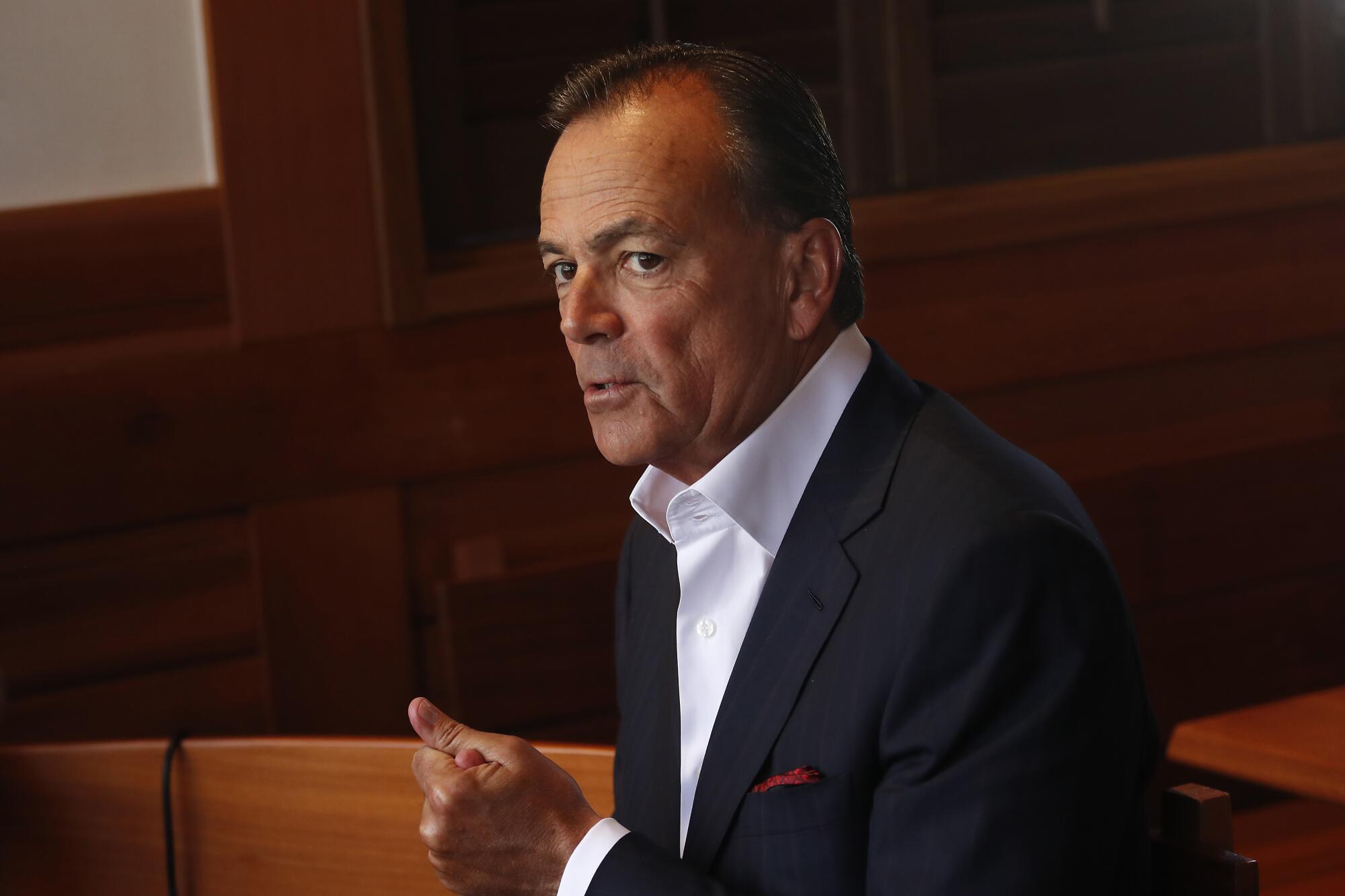
- Share via
It wouldn’t be a Los Angeles mayoral election without Rick Caruso flirting with a run for the city’s top job.
Over the last two decades, the billionaire developer’s dalliances with public office have become something of a cottage industry for the political consultant class.
The man who brought in the team behind the Bellagio’s dancing waters to create fountains for his malls and tapped a retired Walt Disney Imagineer to design the Grove’s trolley has spared little effort when it comes to political exploration.
A decade ago, Caruso hired political consultants who’d worked with Bill Clinton and Al Gore, engaged with civic leaders and came close to getting into the 2013 race, according to people with knowledge of those efforts. There had also been efforts throughout the 2000s.
It got so close in 2013 that Caruso looked into staffing a campaign and preparing for a launch, only to pull the plug, one person who was involved said.
Caruso, 63, was born in Los Angeles to a self-made businessman who founded Dollar Rent A Car. His name has become synonymous with the nostalgia-tinged spectacle of outdoor retail projects such as the Grove, Americana at Brand and Palisades Village. But Caruso’s position in the civic power structure predates his real estate empire. He was appointed to the board of the Department of Water and Power at age 25 — the first of several influential, unelected positions he has held.
Should Caruso decide to enter the 2022 mayoral race before the Feb. 12 filing deadline, his candidacy and the prospect of a self-funded campaign would inject high drama.
Less than five months before the primary, Rep. Karen Bass (D-Los Angeles) has emerged as an apparent front-runner amid a field of candidates that includes City Councilmen Kevin de León and Joe Buscaino and City Atty. Mike Feuer, among several dozen others.
A white developer of luxury retail, residential and hotel projects who spent most of his life as a Republican would provide stark contrast to Bass, a progressive Black congresswoman who made her name doing community work in South Los Angeles.
“I think it’s really a question for Los Angeles around what kind of city we want to live in and what kind of leadership we want to have,” said Black Lives Matter-L.A. leader Melina Abdullah, describing a potential Caruso-Bass matchup as a “test” for Angelenos on the future of the city.
Caruso’s pitch to voters would involve explaining how his success in business would translate to running the city and improving the quality of life for residents.
“No one believes that the same group of politicians who allowed our city to become this unsafe, corrupt and cruel can solve any of the problems we face,” Caruso, who declined to be interviewed, said in a statement. “This unprecedented crisis calls for strong leaders who have track records of managing complex institutions and finding innovative solutions to build housing for our population and to protect our communities.”
He added that he looked forward to “making this final decision shortly.”
Read Rick Caruso’s full statement about running for mayor here
From interviews with nearly 30 friends, associates, political consultants and adversaries, a picture emerged of a man who is serious about running for mayor in part because he believes the city he loves is in a perilous position, and he can present a different way of running government — even if he hasn’t been steeped in the specifics of how to tackle a crisis like homelessness.
“He is going to run for mayor, I believe. It would be hard for me to believe that he’s not going to do it,” said United Talent Agency co-president Jay Sures, a supporter.
Many of those interviewed invoked the last businessman who became mayor — Richard Riordan — saying the parallels to the early 1990s make the time ripe for a person who has not held an elected post to run for mayor.
Riordan was elected in 1993, at a time when Los Angeles faced economic and social upheaval, including the decline of the aerospace industry, the beating of Black motorist Rodney King and the deadly uprising that followed the LAPD officers’ acquittal.
It’s far from clear whether voters are looking for an outsider business candidate now. L.A. is significantly more diverse racially than it was in 1993, and recent elections have underscored a move to the left; notably, Dist. Atty. George Gascón’s 2020 victory on a criminal justice reform plank. Those factors could make it hard for a longtime Republican to win.
Caruso is now registered as “no party preference,” and his political contributions have spanned parties through the years, with donations to former President George W. Bush, the super PAC of House Minority Leader Kevin McCarthy (R-Bakersfield) and the campaigns of Bass, Rep. Ted Lieu (D-Torrance), Gov. Gavin Newsom and Mayor Eric Garcetti.
“We tried having a businessman running the government, and that didn’t turn out very well for America,” said Hope Warschaw, a Bass-supporting political donor who likens Caruso to former President Trump — a widely reviled figure in Los Angeles.
Caruso’s business bloodline and baronial tastes will make Trump comparisons easy fodder for political opponents, but the contradictions of who he is complicate the parallels.
Yes, the L.A. power broker pals around with celebrities and has never held elected office, but he has spent decades steeped in the city’s bureaucratic machinery. Those close to him describe his devout Catholic faith as a primary driver in his life. His mega-yacht Invictus — which has nine bedrooms and rents for $550,000 a week — is named for a Victorian-era poem about remaining the captain of one’s soul despite the brutal batterings of circumstance.
When Bass — architect of the George Floyd Justice in Policing Act — was trying to garner support for her bill in the House, Caruso was one of the surrogates she tapped for outreach.
Before civil rights attorney Connie Rice briefed the bipartisan Problem Solvers Caucus on a controversial aspect of the bill over Zoom, Caruso warmly introduced her, saying he had learned not to disagree with Rice.
Rice has endorsed Bass but described Caruso as someone guided by “a deep moral framework.”
What stopped him from running in 2013 is what could end up stopping him now. After family discussions about whether a run might affect his business empire, Caruso decided that a grueling race wasn’t something he wanted to put his four children through, people involved said.
But his children are older now, and many of the projects that were in development a decade ago have been completed.
Should he enter the race, the Brioni-suited mogul will likely face heat on a number of fronts, be it the allegation that he referred to U.S. Rep. Maxine Waters (D-Los Angeles) as a “b—” in the early 2000s or the fact that Lori Loughlin’s daughter was reportedly spring-breaking aboard his 216-foot yacht when the college admissions scandal broke.
For much of the last year, Caruso has worked with a team of consultants who helped get Newsom elected as governor and Kamala Harris elected to the Senate. They’ve been meeting regularly with Caruso, helping him understand what the job would entail.
If Caruso jumps in, Councilwoman Monica Rodriguez’s policy director, Lex Olbrei, who has worked in labor politics, would be the campaign’s top official. Political heavyweights such as Ace Smith — who helped Newsom fend off a recall last year — and Mark Fabiani are among those advising him.
Caruso, a former lawyer who started his development career in the early 1990s, now has nine retail projects in Southern California. The Grove, which opened in 2002 in the Fairfax district, helped put Caruso on the map internationally as a designer of high-gloss lifestyle centers with a carefully constructed sense of place.
He’s known for being intimately involved with even the smallest details, whether it’s the towels in the gym at his Burton Way luxury apartment building — which were embroidered by the same person who customized the towels in his home — or the hand-selected, crooner-heavy playlists piped through invisible speakers at the Grove.
Real estate consultant David Greensfelder pointed to the double-decker trolley that runs through the Grove as an example of the sort of signature investment that others might decry as superfluously expensive.
“Whether or not you think it’s overproduced, it is a differentiator for the project. I think people go there partly because of the production values of that project,” Greensfelder said.
For some candidates, thousands of new tiny homes, rented hotel rooms and other forms of short-term shelter are the place to start solving homelessness.
Others have criticized Caruso projects for their artifice and Disney-esque qualities. Abdullah described the Grove as a “white fantasy world” where shoppers can pretend that poor and homeless people don’t exist.
“When you walk into the Grove, it’s completely shielded off from the rest of the community, and there are private police who monitor and surveil,” Abdullah said.
In an election dominated by questions of policing and public safety, Caruso would likely position himself as a conservative foil to Gascón’s progressive policies.
After a smash-and-grab robbery at the Grove in November, Caruso said the city was “being torn apart because of bad decisions by leaders” and sharply criticized Proposition 47, a 2014 ballot measure on criminal justice reform.
He joined the Los Angeles Police Commission in 2001, when the LAPD was battered by scandal and disarray. The explosive Rampart corruption scandal had further eroded public trust just a few years after the King beating and subsequent unrest. In the wake of the scandal, the Justice Department imposed a federal consent decree to force sweeping reforms.
In early 2002, Mayor James Hahn decided not to retain LAPD Chief Bernard Parks — the city’s second Black police chief, with deep support in the Black community. Hahn, who is white, wanted to bring in an outsider to remake the department.
“That was a very fraught moment in city history, making the transition from a very recalcitrant old-guard Bernard Parks, who was a brilliant police chief executive but just didn’t believe in any reform and didn’t believe in civilian control,” Rice said.
Rice publicly supported the decision to remove Parks and, as a leading Black civil rights attorney, provided what she described as “racial cover” in the divisive fight.
As Police Commission president, Caruso faced intense political heat for not giving Parks a second term, with Black community groups planning a protest at the soon-to-open Grove during the fight.
Following Parks’ dismissal, Caruso was instrumental in bringing in William J. Bratton, who is widely viewed as a transformational figure in the department’s history. Crime fell, and approval of the LAPD, including among Black and Latino voters, soared during Bratton’s tenure.
More than a decade later, advocates of community policing are still fighting to reshape the LAPD’s paramilitary suppression culture, Rice said, “but you wouldn’t have seen any change in LAPD had Bratton not been installed, and Rick played a pivotal role.”
On a rainy day in late November, the billionaire chairman of USC’s board of trustees sat in the front row of a classroom as one female student after another described how the university had failed women.
More recently, Caruso was at the center of upheaval at another L.A. institution. In May 2018, USC was rocked by scandal and later, a wave of lawsuits, following a Times investigation that found that a school gynecologist had been the subject of numerous complaints of harassment and inappropriate touching during his nearly three decades treating students.
Another prominent trustee was slated to take over as chair of USC’s board of trustees. But after the scandal broke, Caruso — an alumnus, donor and trustee — stepped forward to take the top role. Among his tasks: Rebuilding trust among the student body and faculty, negotiating the exit of President C.L. Max Nikias, finding a new president and otherwise filling a leadership void at the private university.
“People were very shaken by these scandals, one after the other after the other,” said technology entrepreneur and philanthropist David Bohnett, who sits on the USC board.
Caruso quickly brought in trustee and aerospace executive Wanda Austin as interim president and set out to reform the board’s structure. The process entailed persuading the more than 50 trustees to impose term limits on themselves and agree to a smaller board, thus handing over some power and influence.
In an interview, Austin said Caruso was always available to her when she needed help. They would text early in the morning and late at night, and his decisiveness was essential during this tough time, she said.
“He took board reform on, and it was not an easy task,” Austin said, characterizing it as “a very critical change.”
Similarly, Caruso needed to find a permanent successor to Austin and set up a search committee. Professor Geoffrey Cowan, who served on the committee, said Caruso convened listening sessions with students, faculty and other administrators to understand what they wanted in a leader.
“Whether he would be that kind of listener and learner as mayor, I can’t tell you, but my guess is that he would,” Cowan said.
Real estate developer Rick Caruso has been a reliable benefactor at Los Angeles City Hall, giving donations big and small to the city’s politicians and their pet causes.
Still, there’s a question of whether Los Angeles has an appetite for the potential conflicts of interest that would dog a developer with several projects in the city.
Corruption related to developer influence has roiled Los Angeles City Hall in recent years, and voters may be leery of a developer running the city at a time when one former councilman went to prison in a corruption case and another awaits trial.
During her long career as a local politician, Ventura County Supervisor Linda Parks has raised issues with deals made between Caruso and the city of Thousand Oaks that she saw as overly favorable to the developer, at the expense of local taxpayers.
“I’d be concerned it’d be like putting the fox in control of the henhouse,” Parks said.
Times staff writers Maloy Moore and Matt Hamilton contributed to this report.
More to Read
Sign up for Essential California
The most important California stories and recommendations in your inbox every morning.
You may occasionally receive promotional content from the Los Angeles Times.
